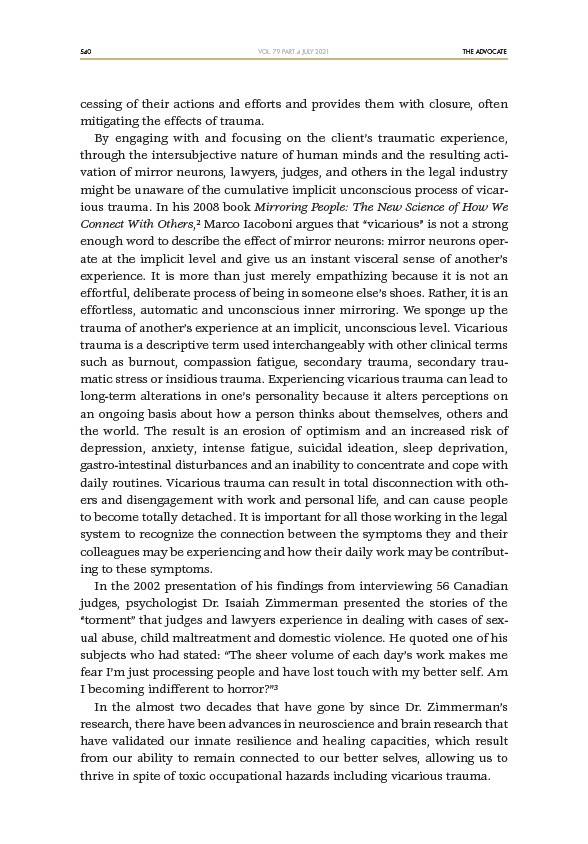
540 THE ADVOCATE
VOL. 79 PART 4 JULY 2021
cessing of their actions and efforts and provides them with closure, often
mitigating the effects of trauma.
By engaging with and focusing on the client’s traumatic experience,
through the intersubjective nature of human minds and the resulting activation
of mirror neurons, lawyers, judges, and others in the legal industry
might be unaware of the cumulative implicit unconscious process of vicarious
trauma. In his 2008 book Mirroring People: The New Science of How We
Connect With Others,2 Marco Iacoboni argues that “vicarious” is not a strong
enough word to describe the effect of mirror neurons: mirror neurons operate
at the implicit level and give us an instant visceral sense of another’s
experience. It is more than just merely empathizing because it is not an
effortful, deliberate process of being in someone else’s shoes. Rather, it is an
effortless, automatic and unconscious inner mirroring. We sponge up the
trauma of another’s experience at an implicit, unconscious level. Vicarious
trauma is a descriptive term used interchangeably with other clinical terms
such as burnout, compassion fatigue, secondary trauma, secondary traumatic
stress or insidious trauma. Experiencing vicarious trauma can lead to
long-term alterations in one’s personality because it alters perceptions on
an ongoing basis about how a person thinks about themselves, others and
the world. The result is an erosion of optimism and an increased risk of
depression, anxiety, intense fatigue, suicidal ideation, sleep deprivation,
gastro-intestinal disturbances and an inability to concentrate and cope with
daily routines. Vicarious trauma can result in total disconnection with others
and disengagement with work and personal life, and can cause people
to become totally detached. It is important for all those working in the legal
system to recognize the connection between the symptoms they and their
colleagues may be experiencing and how their daily work may be contributing
to these symptoms.
In the 2002 presentation of his findings from interviewing 56 Canadian
judges, psychologist Dr. Isaiah Zimmerman presented the stories of the
“torment” that judges and lawyers experience in dealing with cases of sexual
abuse, child maltreatment and domestic violence. He quoted one of his
subjects who had stated: “The sheer volume of each day’s work makes me
fear I’m just processing people and have lost touch with my better self. Am
I becoming indifferent to horror?”3
In the almost two decades that have gone by since Dr. Zimmerman’s
research, there have been advances in neuroscience and brain research that
have validated our innate resilience and healing capacities, which result
from our ability to remain connected to our better selves, allowing us to
thrive in spite of toxic occupational hazards including vicarious trauma.